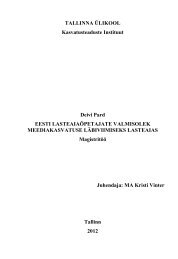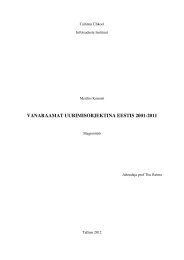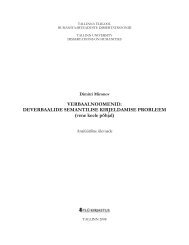- Page 1 and 2:
TALLINNA ÜLIKOOLHUMANITAARTEADUSTE
- Page 3:
TALLINNA ÜLIKOOLHUMANITAARTEADUSTE
- Page 6 and 7:
7. PEATÜKK. Kiriklikud olud ja usu
- Page 8 and 9:
SAATEKSKäesolevat uurimistööd aj
- Page 10 and 11:
keskmiselt iga 16 km tagant ning Me
- Page 12 and 13:
linna kaubanduselust ja käsitööa
- Page 14 and 15:
Tänase päeva seisuga on meeldiv t
- Page 16 and 17:
juba postuumselt avaldatud sisukas
- Page 18 and 19:
kanti pärusraamatusse linnas toimu
- Page 20 and 21:
Tähelepanuväärsel kombel oli ees
- Page 22 and 23:
Valge torni ja Jaani kiriku vahelis
- Page 24 and 25:
Pärnu linnamüür. 131 Hoo sisse s
- Page 26 and 27:
1539. aastal võttis Johann van Lyn
- Page 28 and 29:
Lõunamüüris asetsenud Pühavaimu
- Page 30 and 31:
Uurides Tallinna linnaehitust ja to
- Page 32 and 33:
teada uute raeliikmete valimisest j
- Page 34 and 35:
Näiteks oli enne II maailmasõda s
- Page 36 and 37:
kaupmehed ja kogukonna eliit, linna
- Page 38 and 39:
lähtuvat kooskõlastamist ehitusk
- Page 40 and 41:
Kuivõrd reisiti hobuste ja vankrit
- Page 42 and 43:
poolel elas Uus-Pärnus mitu orduk
- Page 44 and 45:
tulekahjude tõttu linn kolm korda
- Page 46 and 47:
tema parajasti aktuaalsest asukohas
- Page 48 and 49:
lihavõteteks kuni 15 marka, lihuni
- Page 50 and 51:
ordulised suundumused. Järva foogt
- Page 52 and 53:
pärijate vahel. 419 Komtuur aitas
- Page 54 and 55:
peigmehe, Jurgen Wulffiga, nii Pär
- Page 56:
Kroonik Johann Renneri kaardi järg
- Page 59 and 60:
1530.-40. aastatel oli tegelikult K
- Page 61 and 62:
Tähelepanu väärib, miks õieti p
- Page 63 and 64:
linnaga tegelikult palju vahetumad
- Page 65 and 66:
Seoses mõisamajanduse arenguga ord
- Page 67 and 68:
2.6. RELIGIOOSNE ELUEttekujutus ord
- Page 69 and 70:
jutlustaja (undutzsche predicante)
- Page 71 and 72:
näeks meelsasti vana bürgermeistr
- Page 73 and 74:
Bürgermeistreid on Uus-Pärnust 16
- Page 75 and 76:
1541. aastal sai Uus-Pärnu rae lii
- Page 77 and 78:
kui ordulinnas kandvamat rolli linn
- Page 79 and 80:
Ajavahemikus 1518-1562 kuulus Uus-P
- Page 81 and 82:
3.2.2. RaeistungidKui tihti kogunes
- Page 83 and 84:
kronoloogilises järjekorras, ilma
- Page 85 and 86:
teine asi konkreetselt maksis. Raek
- Page 87 and 88:
Kuulide valamiseks oli aasta varem
- Page 89 and 90:
määrata, kuulus ka pool kalakümn
- Page 91 and 92:
sest privileegid annetati “Embeck
- Page 93 and 94:
kuuluvaid kuritegusid. Ainult komtu
- Page 95 and 96:
mängimine (dobbelspil und ein spil
- Page 97 and 98:
müürsepp Andreas Blocki kaasuse k
- Page 99 and 100:
puhangu. 833 Rajati suuri hospidale
- Page 101 and 102:
kahjuks. 850 Ilmselt tähendas see
- Page 103 and 104:
1546. aastal alustas Uus-Pärnu raa
- Page 105 and 106:
kui mingil perioodil tõusis ekspor
- Page 107 and 108:
130 marka, aastase intressiga 12 ma
- Page 109 and 110:
Lisaks kursi kirjeldusele on ta joo
- Page 111 and 112:
varandus, jääb teadmata. Väärib
- Page 113 and 114:
märkimisväärset rolli. 975 Ühel
- Page 115 and 116:
lina. 1000 Paratamatult tekib küsi
- Page 117 and 118:
Tabel 3. Uus-Pärnu tähtsamad impo
- Page 119 and 120:
Vock. Kaupmeeste kompanii oldermann
- Page 121 and 122:
puhastusest. Küll aga väärib tä
- Page 123 and 124:
kaalukalt vahas sisse nõutud kui U
- Page 125 and 126:
jalgset potti ehk graapenit (½ dos
- Page 127 and 128:
sotsiaalset prestiiži. 1114 Külli
- Page 129 and 130:
4.5.1.4.2. Kool ja haridusKaupmehek
- Page 131 and 132:
4.6. KOKKUVÕTEUus-Pärnu suurkaupm
- Page 133 and 134:
eraldi naela-, noa-, mõõga- või
- Page 135 and 136:
friise, toolide ja pinkide seljatug
- Page 137 and 138:
kuid vaevalt oli õlle tootmine ja
- Page 139 and 140:
Liivimaa ordumeistri 1431. aastal v
- Page 141 and 142:
Kirjalike allikate põhjal esines 1
- Page 143 and 144:
sellel elutsevatele ametimeestele.
- Page 145 and 146:
kui raad lupja n-ö välja andis, o
- Page 147 and 148:
5.3. KONTAKTID TEISTE LINNADE JA PI
- Page 149 and 150:
Uus-Pärnu raad andis tema käsutus
- Page 151 and 152:
5.4. VARANDUSLIK SEIS5.4.1. Käsit
- Page 153 and 154:
.4.2. SissetulekudUus-Pärnu käsit
- Page 155 and 156:
noaga kallale. 1384 On tõenäoline
- Page 157 and 158:
klaassepp. Võib-olla oli Heinrich
- Page 159 and 160:
pidada niisugust abiellumisstrateeg
- Page 161 and 162:
keskaja ühiskonnast, perekonnast j
- Page 163 and 164:
majandusliku kindlustatuse saavutam
- Page 165 and 166:
päevadeks. 1478 Just nii on fiksee
- Page 167 and 168:
teistest paremini dokumenteeritud n
- Page 169 and 170:
vendade Loyseneride swager, 1514 mi
- Page 171 and 172:
6.2.2. Laste arv, pere suurusVäide
- Page 173 and 174:
parimad allikad. Mitmest Lääne-Eu
- Page 175 and 176:
venna, Uus-Pärnu bürgermeistri Ni
- Page 177 and 178:
katoliku ajal suhteline tolerants v
- Page 179 and 180:
Engell Grothkoppi jäetud pärandil
- Page 181 and 182:
Uus-Pärnu protokolliraamatust selg
- Page 183 and 184: oli küllaltki jõulise ja jonnaka
- Page 185 and 186: teateid, paraku on need aga ebatäi
- Page 187 and 188: “kirikhärra ja vikaar”. 1680 S
- Page 189 and 190: van Lynthemi mälestused vahetult p
- Page 191 and 192: juurde ka kivist saun. 1736 Linna k
- Page 193 and 194: Hiliskeskajal loeti Euroopa kirikut
- Page 195 and 196: Põhja-Saksa linnades laialt levinu
- Page 197 and 198: 7.1.4. Religioossed gildidUsuelu in
- Page 199 and 200: pühaku hulka, 1830 kuid antud juhu
- Page 201 and 202: skoopiline osa Uus-Pärnus elanud e
- Page 203 and 204: laialt levinud kloostrite vastane h
- Page 205 and 206: vaimulike arvu piirata - kirikhärr
- Page 207 and 208: Pildirüüste kui rituaalne vägiva
- Page 209 and 210: 7.3. EVANGEELIUMIÕPETUSE KINDLUSTU
- Page 211 and 212: kiriku parajasti aktuaalseid proble
- Page 213 and 214: torni vaheline ala, samuti õhku le
- Page 215 and 216: ning Johann Lohmülleri sõnul kait
- Page 217 and 218: Õigupoolest pole Liivimaa sõjale
- Page 219 and 220: 7.3.4.2. Liivimaa sõja eelõhtuVah
- Page 221 and 222: allikaliikide omaga loob veelgi uus
- Page 223 and 224: kuulunud mitmesuguste ametnike näo
- Page 225 and 226: olid Uus-Pärnu eliidile arvatavast
- Page 227 and 228: The present study is about Uus-Pär
- Page 229 and 230: there and others who just purchased
- Page 231 and 232: of getting a position in the town c
- Page 233: probably familiar fields for the Uu
- Page 237 and 238: LISA 3. Uus-Pärnu raeametid 1500-1
- Page 239 and 240: Berndt Hessels 00 N. N. (Hinrich Gr
- Page 241 and 242: LISA 5. Vääringu-, mõõdu- ja ka
- Page 243 and 244: PUBLITSEERITUD ALLIKADAKTEN und Rez
- Page 245 and 246: CLARK, P. 2003. Improvement, Policy
- Page 247 and 248: KALA, T. 2002. Vaimulike elatusviis
- Page 249 and 250: LÖWIS OF MENAR, K. von. 1897. Ausg
- Page 251 and 252: RUSSWURM, C. F. W. 1880. Nachrichte
- Page 253 and 254: KÄSIRAAMATUDARBUSOW, L. (sen). 191
- Page 255 and 256: CURRICULUM VITAEName: Inna Jürjo (
- Page 257: 19. REILI ARGUS. Eesti keele muutem
















